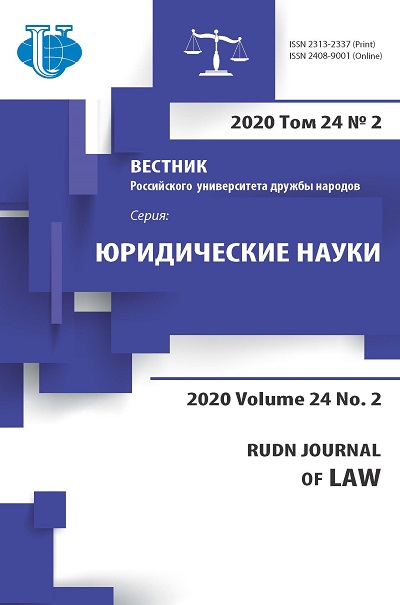LEGAL REGIME OF CREATION OF A SECURE DIGITAL EDUCATIONAL ENVIRONMENT
- Authors: Bokova L.N.1
-
Affiliations:
- Moscow State University M.V. Lomonosova
- Issue: Vol 24, No 2 (2020)
- Pages: 274-292
- Section: EDUCATION LAW
- URL: https://journals.rudn.ru/law/article/view/23934
- DOI: https://doi.org/10.22363/2313-2337-2020-24-2-274-292
- ID: 23934
Cite item
Full Text
Abstract
The relevance of the four-part article is that it examines the legal aspects of the use of information technologies in education, as well as their security, which is the legal basis for regulating these relations. Meanwhile, it should be noted that in recent decades insufficient attention has been paid to these problems in scientific works on jurisprudence. In legal studies the legal constructions of the concepts of “Internet addiction”, “digital educational environment”, “online training”, “digital infrastructure”, etc. have not yet been investigated. The purpose of the study is: 1) to determine the actual directions for improving legislation on the information security of the educational environment; 2) to substantiate the point of view according to which it is necessary to create and implement programs to educate children and adolescents on the rules of safe behavior in the Internet space and to prevent Internet addiction; 3) to better understand the term “safety of the educational environment”. In the research process, a diverse set of methodological tools was used: 1) general philosophical methods (dialectical and idealistic); 2) general scientific methods - analysis and synthesis, deduction and induction, analogy, comparison; 3) private (special) methods - logical, comparative legal, formal legal, normative dogmatic; 4) method of interpretation, including a method of problem-theoretical reconstruction. The paper analyzes the main regulatory documents that are used to implement the digital educational environment. The main results of achieving the goal of the study are proposals on: 1) introduction of the concept of “safety of the educational environment” into the scientific circulation of jurisprudence; 2) relevant legislative initiatives in this area. The theoretical significance of the study. The paper discusses the legal relations prevailing in the field of using information technologies in education, proposes the author’s definition of the legal regime for creating a modern and safe information educational environment. The author formulated priority areas for improving this activity. The indicated research results can be used to improve the science of information law.
About the authors
Lyudmila N. Bokova
Moscow State University M.V. Lomonosova
Author for correspondence.
Email: ludmila@bokova.top
State Secretary - Deputy Minister of Digital Development, Telecommunications and Mass Media of the Russian Federation, applicant for the Department of Computer Law and Information Security of the Higher School of State Audit
1 p. 13 Leninsky mountains, 119991, Moscow, Russian FederationReferences
- Alekseev, S.S. (1989) Obshchie dozvoleniya i obshchie zaprety v sovetskom prave [General permissions and general prohibitions in Soviet law]. Moscow, Yuridicheskaya literaturа Publ. (in Russian).
- Bakhrakh, D.N., Rossinskii, B.V., Starilov, Yu.N. (2008) Administrativnoe pravo. [Administrative law]. Uchebnik [Textbook]. 3-e izdanie, peresmotrennoe i dopolnennoe [3rd edition, revised and supplemented]. Moscow. Norma Publ. (in Russian).
- Bobylev, S.N., Grigoryev, L.M. (eds.) (2018) Chelovek i innovatsii. Doklad Analiticheskogo tsentra pri Pravitel'stve Rossiiskoi Federatsii o chelovecheskom razvitii v Rossiiskoi Federatsii [Man and innovation. Report of the Analytical Center under the Government of the Russian Federation on human development in the Russian Federation]. Moscow, LLC “4T Design” Publ., available at: http://ac.gov.ru/files/publication/a/19663.pdf (Accessed 28 October 2019). (in Russian).
- Isakov, V.B. (1985) Problemy` teorii yuridicheskix faktov [Problems of the theory of legal facts]. Dis…d-ra yurid. nauk [Dis ... dr. jur. sciences]. Sverdlovsk. (in Russian).
- Kanyanina, T.I., Krupoderova, E.P., Stepanova, S.Yu. (2017) Internet-proekt: ot idei do realizatsii. Metodicheskoe posobie [Internet project: from idea to implementation. Toolkit]. Nizhny Novgorod. NIRO Publ. (in Russian).
- Kruchinina, G.A. (2003) Metod proektov v usloviyakh informatizatsii obrazovaniya. V sbornike: Problemy teorii i praktiki podgotovki sovremennogo spetsialista. Mezhvuzovskii sbornik nauchnykh trudov [Project method in the conditions of informatization of education. In the collection: Problems of theory and practice of training a modern specialist]. Pod red. M.A. Vakulinoi. Nizhegorodskii gosudarstvennyi lingvisticheskii universitet im. N.A. Dobrolyubova [Interuniversity collection of scientific papers. Ed. M.A. Vakulina. Nizhny Novgorod State Linguistic University named after ON THE. Dobrolyubova]. Nizhny Novgorod. 113–115. (in Russian).
- Krupoderova, E.P., Krupoderova, K.R. (2015) Internet-proekt kak sredstvo motivacii obuchayushhixsya k polucheniyu obrazovaniya v oblasti IT [Internet project as a means of motivating students to get an IT education]. In the World of Scientific Discoveries. V Mire Nauchnykh Otkrytiy. Vol. 71 Issue 11.1. 604–608. (in Russian).
- Krupoderova, E.P., Krupoderova, K.R. (2018) Internet-servisy dlya postroeniya personal'noi tsifrovoi sredy sovremennogo uchitelya [Internet services for building a personal digital environment of a modern teacher]. Problems of modern teacher education. Collection of scientific papers: Yalta: RIO GPA. 61–4. 176-179. (in Russian).
- Krupoderova, E.P., Krupoderova, K.R. (2016) Organizatsiya vneurochnoi proektnoi deyatel'nosti obuchayushchikhsya s pomoshch'yu setevykh servisov [Organization of extracurricular project activities for students using network services]. Experiment and innovation at school. (3). 66–70. (in Russian).
- Matuzov, N.I., Malko, A.V. (1996) Legal Regimes: Questions of Theory and Practice. Pravovedenie. (1). 16–29. (in Russian).
- Slepukhin, A.V. (2014) Usage of personal educational environment in the process of individualization of mixed learning of students. Pedagogical Education in Russia. (11). 195–205. (in Russian).
- Stepanova, S.Yu. (2017) Sostavlyayushchie uspeshnosti internet-proekta [The components of the success of the Internet project]. V sbornike: Sovremennye obrazovatel'nye Webtekhnologii v sisteme shkol'noi i professional'noi podgotovki sbornik statei uchastnikov Mezhdunarodnoi nauchno-prakticheskoi konferentsii [In the collection: Modern educational Web-technologies in the system of school and vocational training collection of articles by participants of the International scientific and practical conference]. 95–98. (in Russian).
Supplementary files















